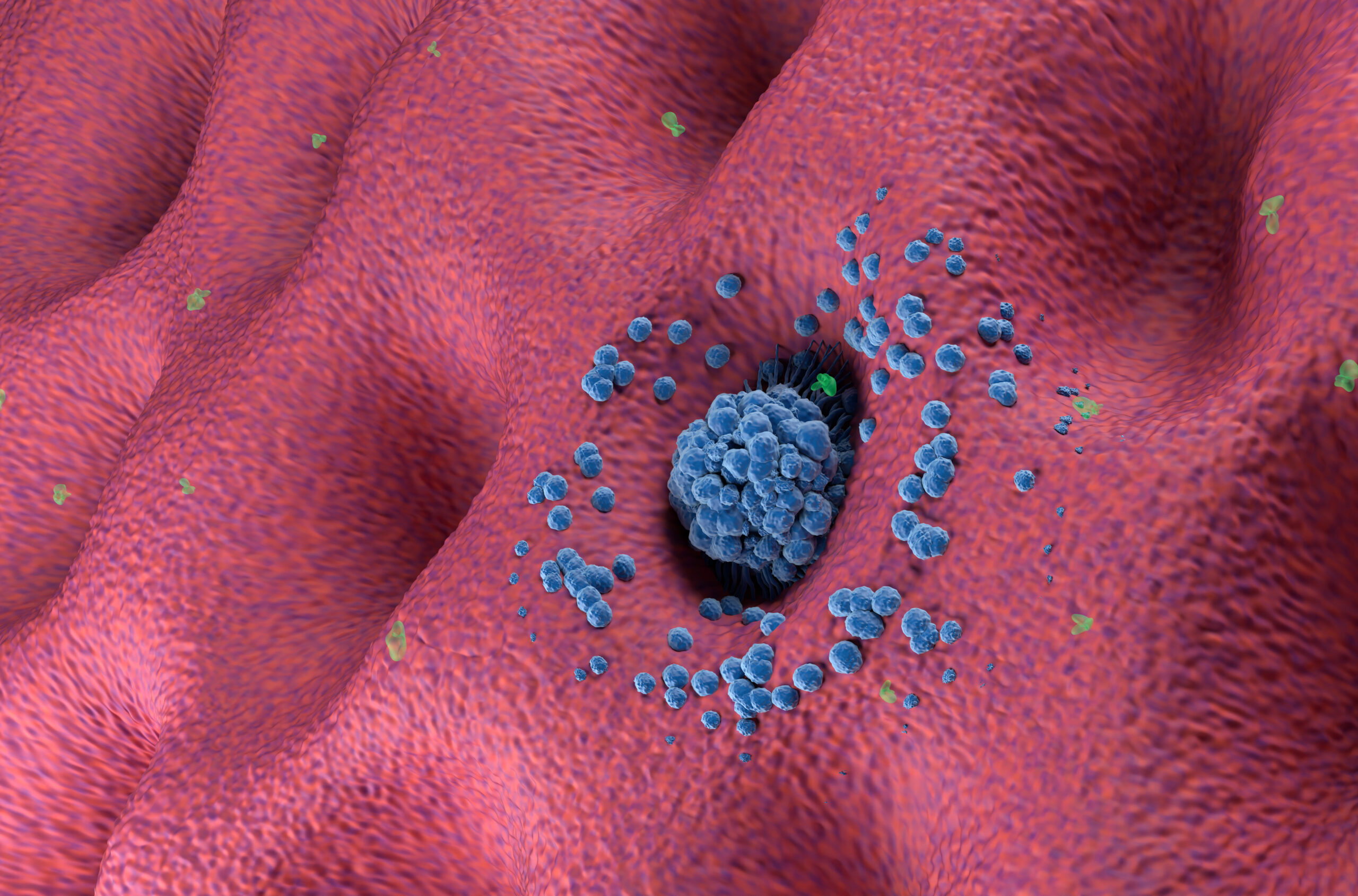“Personalized” battle against GI cancers: Highlights from ASCO GI 2024
Personalized medicine is revolutionizing the field of oncology, and gastrointestinal (GI) cancers are at the forefront of this exciting development. While immunotherapy has made a transformational impact in many areas, it hasn’t seen the same level of success in GI cancers. This has led to rising recognition of cancer heterogeneity and highlighting the need for personalization for therapeutic benefit in subpopulations.
The key highlights at ASCO GI 2024 resonated with the theme of ‘Taking Personalized Care to the Next Level’ and provided a glimpse into the future of personalized medicine for GI cancers. We summarize key highlights from the conference below:
Established Targets
HER2: What more to expect in GI cancer?
- Addressing tumor heterogeneity in high unmet need locally advanced gastric cancer
- Modest single agent T-DXd activity in neoadjuvant locally advanced gastric cancer (<5% pCR) will be augmented with durvalumab and chemo combination in a planned study1
- Atezolizumab added to trastuzumab and XELOX in peri-operative locally advanced gastric cancer patients led to more than doubling of pCR (38% vs 14% in a phase 2 RCT Chinese trial); further studies required to confirm effectiveness2
- T-DXd aims to expand its utility to HER2 low gastric cancer patients, similar to breast cancer
- In the phase 1b trial design of DESTINY-Gastric03 presented, an expansion cohort in L1 HER2 low gastric cancer will evaluate T-DXd combination with volrumostig (PD-1 X CTLA4 BiSp) + chemo3; early efficacy of T-DXd mono in HER2 low gastric has been reported4
- Addressing optimal sequencing of available treatments in pre-treated HER2+ gastric cancer patients
- In a small Japanese single institution study, treatment sequencing options of Nivolumab followed by T-DXd and vice versa were shown to be equally effective in L3+ HER2+5
- Making inroads into pretreated metastatic biliary tract cancer
- A novel biparatopic HER2 BiSp, zanidatamab demonstrated improvement in patient HRQoL in HERIZON BTC-01 phase 2b trial in HER2 amp (clinical efficacy had been reported earlier), supporting its continued development6
FGFR: Further improving effectiveness?
- Next gen FGFR inhibitors target different FGFR alterations or binding sites of the FGFR2 kinase domain to address gaps with the approved 1st gen FGFRi in FGFR2 fusion/rearrangements
- Tinengotinib, a next gen FGFRi, reported encouraging RR of 40% in FGFRi refractory BTC patients and 31% RR in other FGFR alterations (e.g. point mu) in a phase 2 study; trial design of ongoing randomized phase 3 in similar patients was also presented7,8
- Eisai recently filed for marketing authorization of Tasurgratinib in FGFR2 fusion/rearrangements Japanese patients based on 30% RR from a single arm phase 2; clinical outcomes were presented at ASCO GI 20249
Validated Targets
KRAS: Unabated excitement around the initially considered undruggable target?
- KRASG12Ci have demonstrated effectiveness in GI cancers with a surge of pipeline activity
- Recently PFS benefit was reported from randomized CODEBREAK300 study in pretreated CRC with sotorasib + panitumumab, mature OS awaited; data from an expansion cohort in 2L mCRC was presented10
- MK-1084, a GTP bound G12Ci, is also being evaluated in 2 GI cancer specific cohorts targeting treatment naive and pre-treated patients (with cetuximab + chemo and cetuximab combinations, respectively)11
- Next gen GDP bound G12Ci, glecirasib and olomorasib, demonstrated >40% RR across several GI cancers, in early phase studies supporting further development12,13
- The more prevalent KRASG12D mutations in GI cancers have a complex disease biology posing challenges for therapeutic drug intervention
- With KRASG12D mutations, the KRAS protein remains constitutively active, even in the absence of external signals; the disease biology was further elucidated in different GI cancers
- Poor OS outcomes associated with positive KRASG12D/Q61 mutations vs other KRAS mu in a retrospective ctDNA analysis from PDAC patients; also, frequently occurring co-alterations in TP53 and CDKN2A, suggested involvement of multiple bypass resistance mechanisms14
- However, a Japanese study in mCRC, suggested no detrimental prognostic impact on PFS and OS in KRASG12D mu vs KRAS non-G12D mutations.15
- Early phase study design with novel amphiphile vaccine (ELI-002 7P) targeting CRC and PDAC patients with KRASG12D, G12R, G12V, G12C, G12A, G12S and G13D mu in adjuvant settings, AMPLIFY-7P was presented16
- With KRASG12D mutations, the KRAS protein remains constitutively active, even in the absence of external signals; the disease biology was further elucidated in different GI cancers
CLDN18.2: Optimizing treatment strategies?
- Several emerging and diverse modalities are being explored to expand the drug arsenal against CLDN18.2, a clinically validated target in gastric cancer (zolbetuximab slated for approval, though 3rd party manufacturing issues need to be addressed, though with ~85% grade 3 TEAEs)17,18
- Cell therapies – potential for a potent and sustained immune response in immuno-resistant GI tumors
- Phase 1/2 trial design presented for CLDN18.2 directed autologous T cell (TAC)19
- 43% RR in phase 1 with CLDN18.2 CART-therapy in pancreatic and gastric cancers20
- Antibody drug conjugates – Potential of targeted ‘chemo warhead’ in chemo dependent GI tumors
- Phase 1 trial design for EO-3021, CLDN18.2 targeting ADC, in solid tumors was presented21
- Cell therapies – potential for a potent and sustained immune response in immuno-resistant GI tumors
Emerging Targets
WNT Pathway: Identifying the right target?
- Identifying the right target upstream or downstream on the dysregulated WNT signaling pathway (predominant in GI cancers) that can be ‘inhibited’ with minimal off target effects has continued to be a key challenge for therapeutic intervention
- DKN-01, a Dickkopf-1 (DKK1) inhibitor, showed promising 30% RR in 2L MSS CRC (with chemo + bev), and breadth of activity across various sub-populations such as KRAS mu, no prior bev treated patients (in phase 2 randomized DeFianCe study) 22
- Additional WNT targets for blockade include a porcupine (PORC) inhibitor, RXC00423
- APC biomarker, downstream of WNT signaling, was shown to successfully predict response to EGFRi therapy in RAS mu CRC patients.24
Based on the key highlights from ASCO GI 2024, what are the key scientific, clinical, and commercial implications for biopharma developing drugs in GI cancers? What may be the potential opportunities and gaps in their portfolio? Potential BD&L opportunities?
Please reach out to Putnam to understand our capabilities and how we can partner with you!
References:
- ASCO GI 2024, Abs# 309, Takahari et al. ‘Phase 2 study of trastuzumab deruxtecan as neoadjuvant treatment for HER2-positive gastric and gastroesophageal junction adenocarcinoma (EPOC2003).’
- ASCO GI 2024, Abs# 312, Peng et al. ‘Atezolizumab and trastuzumab plus chemotherapy in patients with HER2+ locally advanced resectable gastric cancer or adenocarcinoma of the gastroesophageal junction: A multicenter, randomized, open-label phase II study.’
- ASCO GI 2024, Abs# TPS424, Janjigian et al. ‘Phase 1b/2, open-label dose-escalation and -expansion study evaluating trastuzumab deruxtecan (T-DXd) monotherapy and combinations in patients (pts) with HER2+ and HER2-low gastric cancer (GC): DESTINY-Gastric03 (DG-03).’
- Yamaguci et al. J Clin Oncol 2022 41:816-825, ‘Trastuzumab Deruxtecan in Anti–Human Epidermal Growth Factor Receptor 2 Treatment– Naive Patients With Human Epidermal Growth Factor Receptor 2–Low Gastric or Gastroesophageal Junction Adenocarcinoma: Exploratory Cohort Results in a Phase II Trial.’
- ASCO GI 2024, Abs# 265, Shimozaki et al. ‘Efficacy and safety of trastuzumab deruxtecan and nivolumab as third- or later-line treatment for HER2-positive advanced gastric cancer: A single-institution retrospective study.’
- ASCO GI 2024, Abs# 450, Pant et al. ‘Zanidatamab (zani) in previously treated HER2+ biliary tract cancer (BTC): Impact on patient-reported pain outcomes in the phase 2b HERIZON-BTC-01 study.’
- ASCO GI 2024, Abs# 432, Zhang et al. ‘Tinengotinib (TT-00420) in combination with atezolizumab in Chinese patients (pts) with biliary tract carcinoma (BTC): Preliminary efficacy and safety results from a phase Ib/II study.’
- ASCO GI 2024, Abs# TPS575, Javle et al. ‘First-308: Phase III study of tinengotinib versus physician’s choice in patients with FGFR-altered, chemotherapy- and FGFR inhibitor–refractory/relapsed cholangiocarcinoma.’
- ASCO GI 2024, Abs# 471, Furuse et al. ‘Pivotal single-arm, phase 2 trial of tasurgratinib for patients with fibroblast growth factor receptor (FGFR)-2 gene fusion-positive cholangiocarcinoma (CCA).’
- ASCO GI 2024, Abs# 128, Yaeger et al. ‘A phase 1b study of sotorasib combined with panitumumab as second-line treatment of KRAS G12C-mutated colorectal cancer.’
- ASCO GI 2024, Abs# TPS232, Lugowaska et al. ‘A phase 1, open-label, multicenter study evaluating MK-1084 as monotherapy and in combination with other therapies in patients with KRAS G12C mutant advanced solid tumors.’
- ASCO GI 2024, Abs# 604, Jian Li et al. ‘Preliminary activity and safety results of KRAS G12C inhibitor glecirasib (JAB-21822) in patients with pancreatic cancer and other solid tumors.’
- ASCO GI 2024, Abs# 94, Hollebecque et al. ‘Efficacy and safety of LY3537982, a potent and highly selective KRAS G12C inhibitor in KRAS G12C-mutant GI cancers: Results from a phase 1 study.’
- ASCO GI 2024, Abs# 636, Yousef et al. ‘Frequency and oncologic outcomes of KRAS mutations in circulating tumor DNA of patients with pancreatic ductal adenocarcinoma.’
- ASCO GI 2024, Abs# 105, Hirose et al. ‘A retrospective analysis of the prognostic impact of KRAS G12D mutation in patients with RAS-mutated metastatic colorectal cancer.’
- ASCO GI 2024, Abs# TPS720, Wanberg et al. ‘AMPLIFY-7P: Phase 1 and randomized phase 2 study of amphiphile immunotherapy ELI-002 7P as adjuvant treatment for subjects with G12D, G12R, G12V, G12C, G12A, G12S and G13D Kirsten rat sarcoma (KRAS)-mutated pancreatic ductal adenocarcinoma.’
- Astellas [Online]. Available from: press release, [Accessed Jan 2024].
- Shitara et al. May 2023, ‘Zolbetuximab plus mFOLFOX6 in patients with CLDN18.2-positive, HER2-negative, untreated, locally advanced unresectable or metastatic gastric or gastro-oesophageal junction adenocarcinoma (SPOTLIGHT): a multicentre, randomised, double-blind, phase 3 trial.’
- ASCO GI 2024, Abs# TPS419, Dumbrava et al. ‘First-in-human phase 1/2 trial evaluating TAC01-CLDN18.2 autologous T cells in CLDN18.2-positive solid tumors.’
- ASCO GI 2024, Abs# 356, Botta et al. ‘CLDN18.2 chimeric antigen receptor T cell therapy for patients with advanced gastric and pancreatic adenocarcinoma: Results of ELIMYN18.2 phase 1b clinical trial.’
- ASCO GI 2024, Abs# 429, Pelster et al. ‘A phase I study of EO-3021 in adult patients with solid tumors likely to express CLDN18.2.’
- DeFianCe study of DKN-01 in L2 MSS CRC.
- NCT04907539.
- ASCO GI 2024, Abs# 56, Thota et al. ‘APC as a high-utility mutational biomarker that may identify subpopulations of patients with mutant RAS/BRAF and right-sided colorectal cancer (CRC) who derive benefit from EGFR inhibitors (EGFRi).’

Jump to a slide with the slide dots.
 Rudiger Papsch
Rudiger Papsch
MAPS EMEA 2025: Driving Transformation and Excellence in Medical Affairs
Explore how MAPS EMEA 2025 redefined Medical Affairs - patient-centricity, AI, evidence generation & launch excellence take center stage
Read more Jo Ann Saitta
Jo Ann Saitta
Why AI Needs Humans: The Critical Thinking Advantage in Pharmaceutical Commercialization
AI speeds pharma insights, but human experts turn them into action. ClarityNav blends AI power with strategic, real-world expertise.
Read more Radosław Skowron
Radosław Skowron
Acceptance of Artificial Intelligence in Evidence and Dossier Developments by HTA bodies: Challenges and Opportunities
AI is transforming Health Technology Assessment, but trust, transparency, and clear HTA guidance are key to broader acceptance.
Read more